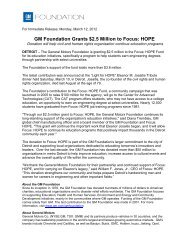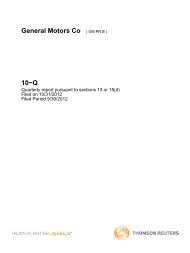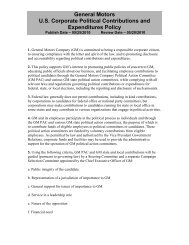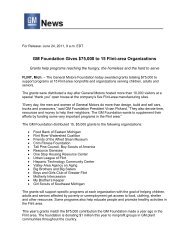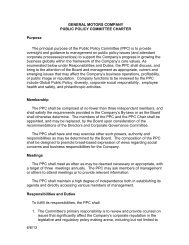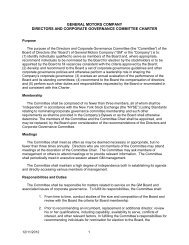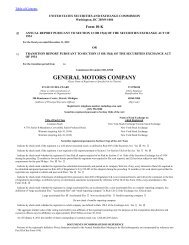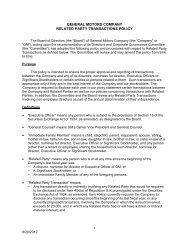General Motors Company
General Motors Company
General Motors Company
You also want an ePaper? Increase the reach of your titles
YUMPU automatically turns print PDFs into web optimized ePapers that Google loves.
materials. To vote by mail, mark, sign, and date the proxy card or voting instruction form included with<br />
the materials and return it in the enclosed envelope in time to be received by the date of the annual<br />
meeting. If you receive more than one proxy card or voting instruction form (which means you have<br />
shares in more than one account), you must mark, sign, and date each proxy card or voting instruction<br />
form.<br />
• For stockholders who received a mailed Notice of Internet Availability of Proxy Materials (the<br />
“Notice”): You may access and review the proxy statement and Annual Report and submit your proxy<br />
by Internet or telephone by following the instructions provided in the Notice or on the website<br />
indicated in the Notice. To vote by mail, request a printed copy of the proxy materials and follow the<br />
instructions on the proxy card or voting instruction form enclosed with the proxy materials.<br />
• For stockholders who received the proxy materials electronically: You may access and review the<br />
proxy statement and Annual Report and submit your proxy by Internet or by telephone by following<br />
the instructions provided in the e-mail notification.<br />
By voting your proxy by Internet, telephone, or mail, you will authorize the Proxy Committee to vote your<br />
shares of Common Stock as you direct and as they determine on any matters that we do not know about now but<br />
that may be presented properly at the meeting. The Proxy Committee is composed of the following executive<br />
officers of the <strong>Company</strong>: Daniel F. Akerson, Stephen J. Girsky, and Daniel Ammann, each of whom is<br />
authorized to act on behalf of the Committee.<br />
I am a beneficial owner. What happens if I do not provide voting instructions to my broker?<br />
As a beneficial owner (meaning that you own shares through a broker, bank, or other nominee), you must<br />
provide voting instructions to your broker, bank, or other nominee by the deadline provided in the materials you<br />
receive from your broker, bank, or other nominee to ensure your shares are voted in the way you would like. If<br />
you do not provide voting instructions to your broker, bank, or other nominee, whether your shares are voted<br />
depends on the type of item being considered for vote. For example, your broker, bank, or other nominee is<br />
not permitted to vote on your behalf on the election of directors (Item No. 1) or the advisory proposal to<br />
approve executive compensation (Item No. 3) unless you provide specific instructions.<br />
What are the voting requirements to elect the directors and to approve each of the proposals?<br />
Under GM’s Bylaws, directors are elected by a majority in uncontested elections and by plurality in<br />
contested elections. A contested election is one in which the number of nominees exceeds the number of<br />
directors to be elected. We do not anticipate that the election of directors at the 2011 annual meeting will be<br />
contested.<br />
In an uncontested election, nominees will be elected directors if they receive a majority of the votes cast<br />
(i.e., the number of shares voted “for” a director must exceed the number of votes cast “against” that director,<br />
without counting abstentions).<br />
In a contested election, the nominees who receive a plurality of the votes cast (i.e., more votes in favor of<br />
their election than other nominees) will be elected directors.<br />
Each proposal in this proxy statement aside from the election of directors will be approved if it receives a<br />
majority of the votes present, either in person or by proxy, and entitled to vote at the meeting. If you submit your<br />
proxy or attend the meeting but choose to abstain from voting on any proposal, you will be considered present at<br />
the meeting and not voting in favor of the proposal. Since Item Nos. 2 and 3 will pass only if they receive<br />
favorable votes from a majority of votes present and entitled to vote at the meeting, the fact that you abstain and<br />
do not vote in favor of a proposal will have the same effect as if you had voted against the proposal. In contrast, a<br />
“broker non-vote” is deemed not entitled to vote at the meeting with regard to a proposal so that it does not have<br />
any effect on the outcome of a vote. Under New York Stock Exchange (“NYSE”) rules, if your shares are held by<br />
2



